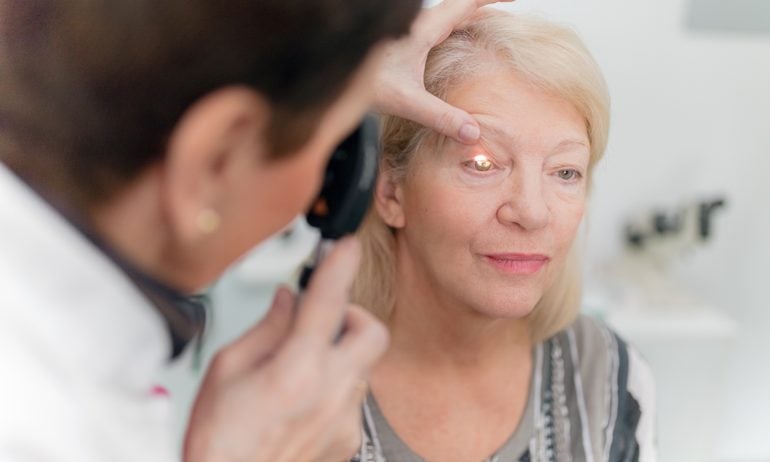Does Medicare Cover Eye Exams?
Original Medicare doesn't cover routine eye exams in most cases. But there are some exceptions and alternatives.

Many, or all, of the products featured on this page are from our advertising partners who compensate us when you take certain actions on our website or click to take an action on their website. However, this does not influence our evaluations. Our opinions are our own. Here is a list of our partners and here's how we make money.
Original Medicare doesn't cover routine eye exams for glasses or contacts.
Original Medicare covers eye care for certain diseases, or if you're at risk for glaucoma.
Most Medicare Advantage plans offer some vision coverage.
Original Medicare doesn't cover eye exams unless you’re known to be in a high-risk group for eye disease, although most Medicare Advantage plans do include some coverage for vision care.
Because some potentially serious eye conditions aren't apparent to the patient in their early stages — when treatment could prevent or reduce loss of vision — it makes sense for anyone eligible for Medicare to find a way to get regular eye exams.
Most Americans ages 60 and up should have a dilated eye exam every year or two, as should people in high-risk groups, such as those 40 and older who are African American and individuals with high blood pressure, diabetes or a family history of glaucoma, according to the National Eye Institute.
Shopping for Medicare plans? We have you covered.

3.95
CMS Star Rating
from UnitedHealthcare

3.63
CMS Star Rating
When does Medicare cover vision exams?
Medicare Part B (part of Original Medicare) covers an eye exam only when a patient has a disease that can cause loss of vision or blindness, or is at risk for one of those diseases, such as glaucoma.
Does Medicare cover eyeglasses or contact lenses?
Original Medicare doesn't cover corrective lenses in most cases. However, Medicare Part B may cover one pair of eyeglasses or contact lenses if needed after cataract surgery. (If you want options beyond standard glasses, such as tinted lenses or scratch-resistant coating, you would pay any additional costs.)
Does Medicare cover eye exams for glaucoma?
You’re covered for one glaucoma test every 12 months by Medicare Part B if you’re considered at high risk for developing glaucoma. You’re high-risk, according to Medicare, if you have diabetes, there’s glaucoma in the family, you’re African American and 50 or older, or you’re Hispanic and 65 or older.
Does Medicare cover diabetic eye exams?
If you have diabetes, Medicare Part B will cover one eye exam per year for diabetic retinopathy. Make sure you see an eye doctor who’s qualified to do the test.
Does Medicare cover macular degeneration?
If you have age-related macular degeneration, you may be covered for some tests and treatment of eye conditions under Medicare Part B.
Does Medigap or Medicare Advantage cover eye exams?
Medigap, also known as Medicare Supplement Insurance, is private health insurance that covers certain out-of-pocket costs of Original Medicare, such as coinsurance and deductibles. Medigap typically doesn't cover routine eye exams for people who haven't been identified as high risk.
Medicare Advantage, also known as Medicare Part C, is also provided through private insurance companies, and usually covers eye exams even when you’re not in a high-risk group. Contact the private insurers that offer Medicare Advantage plans to ask about their vision care coverage, which might include eyeglasses and contact lenses as well as eye exams.
But since a routine eye exam isn't a major medical expense, choosing Medicare Advantage just for that coverage may not provide the best value.
How else can you get eye exam coverage?
Private vision insurance, offered by many employers and also available to individuals, is a way to spread out over the year some of the costs of eye exams, eyeglasses and contacts, and possibly save money. Vision plans from VSP Vision Care, one of the biggest providers of vision coverage, start as low as $13 a month.
For some people, it may make sense to pay for their eye exams out of pocket. The average cost of a dilated eye exam, including a vision test and other assessments, is about $157 to $159, according to FAIR Health, a health care cost company.
For people with low incomes, Medicaid in most states covers routine eye exams. Some states have copays, but they're usually small.
The American Academy of Ophthalmology’s EyeCare America program offers eligible people ages 65 and older an eye exam by a volunteer ophthalmologist, often with no out-of-pocket cost. You don't need a low income to qualify for this program.


